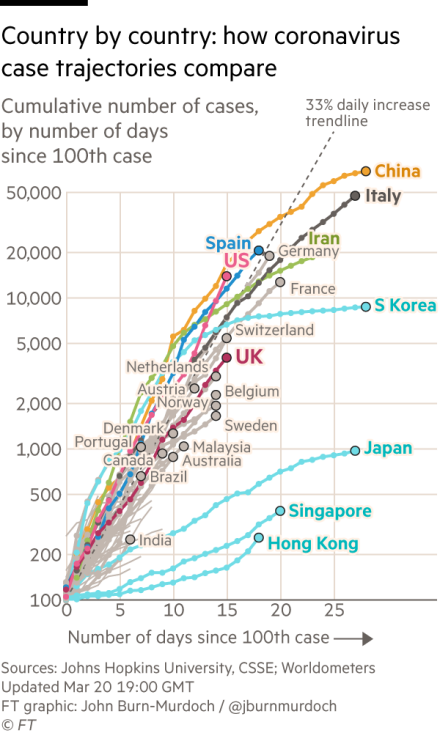Interesting piece of commentary on the Beeb Linky
It backs up some of the arguments that the models predicting such a high number of deaths in the UK are potentially over-egged, and are missing some key factors. It notes that officially, we have 8000 deaths in the UK, each year, directly attributable to Flu. It also notes that of those who will die now, many will have died anyway and whilst the dead may have the virus in their system, we do not know if they died of the virus or of their underlying illness.
Just goes to show that not even the experts know the answer, and it is all very grey, and not as black and white as some argue. I don't think anyone is arguing that some people will definitely die earlier than their time, but many deaths that are attributed to the virus will have been people who would die anyway this year (although their deaths may be brought forward). It goes back to the risk/reward, or payoff, for doing nothing to doing the extreme that we (and other countries) are doing now.
One interesting figure in the article, and I suppose if you step back and think about it, it shouldn't be that surprising, is we have 500,000 to 600,000 deaths in the UK every year anyway.
Hindsight will tell us how well our actions were, for now we all have our own biased view I guess.
It's a short article, but just a few quotes :
It backs up some of the arguments that the models predicting such a high number of deaths in the UK are potentially over-egged, and are missing some key factors. It notes that officially, we have 8000 deaths in the UK, each year, directly attributable to Flu. It also notes that of those who will die now, many will have died anyway and whilst the dead may have the virus in their system, we do not know if they died of the virus or of their underlying illness.
Just goes to show that not even the experts know the answer, and it is all very grey, and not as black and white as some argue. I don't think anyone is arguing that some people will definitely die earlier than their time, but many deaths that are attributed to the virus will have been people who would die anyway this year (although their deaths may be brought forward). It goes back to the risk/reward, or payoff, for doing nothing to doing the extreme that we (and other countries) are doing now.
One interesting figure in the article, and I suppose if you step back and think about it, it shouldn't be that surprising, is we have 500,000 to 600,000 deaths in the UK every year anyway.
Hindsight will tell us how well our actions were, for now we all have our own biased view I guess.
It's a short article, but just a few quotes :
The figures for coronavirus are eye-watering. But what is not clear - because the modellers did not map this - is to what extent the deaths would have happened without coronavirus.
Many would be within this "normal" number of expected deaths. In short, they would have died anyway.
It was a point conceded by Sir Patrick at a press conference on Thursday when he said there would be "some overlap" between coronavirus deaths and expected deaths - he just did not know how much of an overlap.
It was a point conceded by Sir Patrick at a press conference on Thursday when he said there would be "some overlap" between coronavirus deaths and expected deaths - he just did not know how much of an overlap.
In contrast, the figure he gave for flu deaths to MPs - 8,000 - is different. It is actually the number of deaths over and above what you would expect to happen in any given year.
ut there is certainly evidence to suggest the modellers have underestimated the ability of the NHS to increase intensive care capacity.
What else has not been done is a proper assessment of the economic and social costs of the measures taken, which themselves will put lives and health at risk.
we will need much greater intelligence on just how many lives are truly being saved, and compare that to the wider cost to society, so the government and the public can weigh up the best course of action









Comment